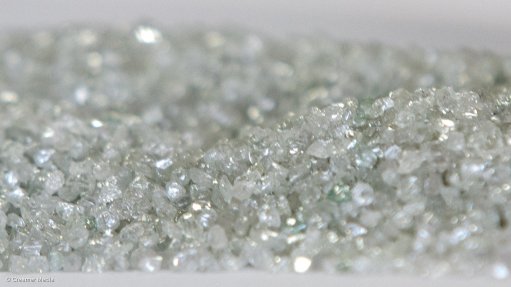
STRICTLY CONTROLLED
More than 99.8% of all diamonds produced are certified by the Kimberley Process Certification Scheme
Photo by: Duane Daws
A motion for a resolution that assumes the Kimberley Process Certification Scheme (KPCS) – the supervisory body established to ensure conflict diamonds from entering the mainstream rough diamond market – has failed in combating the prevalence of conflict diamonds was recently passed by the Belgium Parliament.
This motion claims that the KPCS has failed in its purpose and does not provide markets with the assurance that the diamonds are not conflict diamonds.
This is partly related to the fact that the KPCS has allowed Zimbabwe to re-export goods from the Marange diamond fields, which, according to the KPCS, are 100% ‘conflict free’, but which according to several nongovernmental organisations (NGOs), are illegitimate.
Dubai Diamond Exchange chairperson Peter Meeus, a former Antwerp World Diamond Centre director-general, tells Mining Weekly that he strongly disagrees with this.
“I believe that NGOs are calling for additional efforts to be put in place to ensure that assumed human rights violations related to the trade, manufacture or mining of diamonds do not take place.”
This should be regarded as a request by the Belgium government to the European Com-mission (EC) to have additional supply chain controls put in place that go beyond what is currently provided for in the KPCS.
The impact of such a resolution, and the call for additional supply chain controls on the diamond industry going forward may see the implementation of tighter legislative measures by the EC, which may, in turn, negatively impact the global trade of diamonds.
“Indirectly, these measures could further impact on trade as they may result in an informal embargo against certain countries where there are assumed human rights violations,” says Meeus.
In 2014, diamonds are the most strictly checked raw materials in the world. With the exception of uranium, no other raw materials are so strictly controlled and observed as rough diamonds. More than 99.8% of all diamonds produced are certified by the KPCS. Problem countries, such as the Central African Republic (CAR), Côte d’Ivoire, Guinea and Venezuela, do not even represent 0.2% of world production.
Already in April 2013, when the problems started in the CAR, the KPCS – of which Meeus is a part of on behalf of the UAE – took measures to ensure that the country could not export illegal diamonds.
In this way, the KPCS was the first and only system to ensure, in a very short time, that rebels do not get the opportunity to finance insurgencies through the sale of rough diamonds.
Despite this, NGOs have started to criticise the KPCS for failing to address the issue of human rights abuses in the world’s diamond fields.